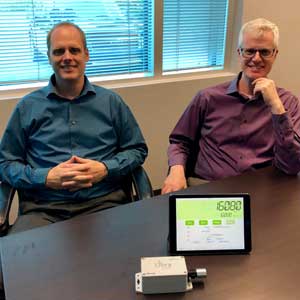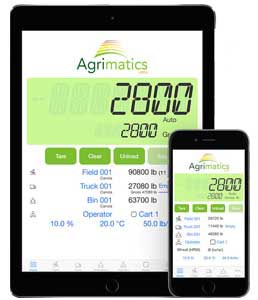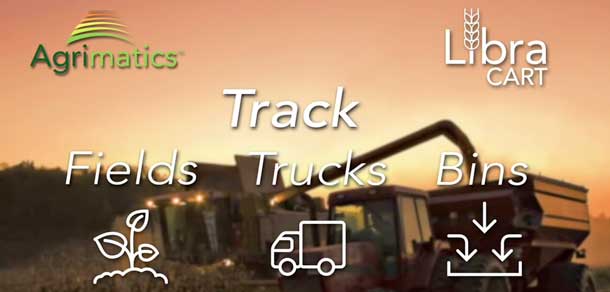The first lesson that Michael Lockerbie, P.Eng. and Ian Meier, P.Eng., the founders of Bitstrata Systems, learned about entrepreneurship is that it is highly stressful.
“We had to move fast. We had both quit our jobs, so we couldn’t wait around for the perfect idea. We had to just go with the first one that made sense,” says Meier.
The two electrical engineers had been almost like career brothers. Meier had worked with Lockerbie at his first job and ended up working for many of the same firms over the years. Each of them had a long background developing high-tech solutions for companies like Brandt Industries and International Road Dynamics.
Today their Saskatoon-based company makes the Agrimatics line of electronics, a market force in precision agriculture across North America and Australia.
An Apple a Day
 The inspiration for them to try their hand at developing their own products came from a rather mundane source: the latest iPhone at the time.
The inspiration for them to try their hand at developing their own products came from a rather mundane source: the latest iPhone at the time.
“Apple had put some new Bluetooth capabilities into their phones that we thought offered an interesting, user-friendly way to interact with sensing equipment. We had tried in our previous jobs to develop products that were similar but they were clumsier, requiring clunky external monitoring equipment, and the results weren’t as good as you could now achieve on your phone. So Mike and I set out to capitalize on those capabilities.”
The pair did not move immediately into the agricultural field. They began with an oil industry application. But they ultimately decided that the agriculture industry offered the best prospects for a proof-of-concept product.
“We were looking for markets where there was a need for a constant operator to do real-time tracking and where cloud connectivity would be useful. The farm sector seemed to fit the bill. Plus, for me, coming from a farm background, it seemed like coming full circle. We did some informal market research and everyone seemed to like the idea so we decided to go for it.”
Libra Cart
 The company’s flagship product is Libra Cart, a system for monitoring the loading and unloading of grain carts through a Bluetooth connection to a smartphone or tablet.
The company’s flagship product is Libra Cart, a system for monitoring the loading and unloading of grain carts through a Bluetooth connection to a smartphone or tablet.
Grain carts have for some time come installed with devices called load cells that monitor weight in the cart. Previous systems to interface with the load cells have been unwieldy. Agrimatics’s system connects a Bluetooth transmitter to the load cells and this is picked up by software on the mobile device. An add-on service, Aero Cloud, backs up data from the readings to the cloud.
The service delivers a host of benefits for farmers, Meier says.
“It makes sure you don’t overload the truck so you don’t get costly road tickets. Crop insurance accepts it as proof of yield for claims. Compared to traditional methods of tracking loads – just writing it down – it’s a tremendous time saver. It provides GPS monitoring that gives the farmer very precise information on where grain was loaded or unloaded. As farms get bigger, it becomes harder to manage all of this sort of information. Many customers view this as their most important tool for managing harvest.”
In addition to booming worldwide sales, the product has won numerous awards, including the 2013 Tech Venture Challenge, the 2013 P2C Business Planning Competition, Manitoba Ag Days’ Inventor’s Showcase and the Science Technology and Innovation Product Award.
Libra TMR
With their newest product, Libra TMR, Agrimatics has branched out to the livestock industry. The system allows farmers to monitor and remote-control feed rations for livestock directly from a mobile device.
The product won the Canada’s Farm Progress Show Sterling Innovation Award in 2017.
Building a company you’d want to work for
Agrimatics operates out of Innovation Place in Saskatoon where it benefits from synergies with surrounding businesses. Much of the company’s electronics are built by SED Systems, Saskatchewan’s world-class satellite communications company.
With production largely outsourced, the company runs a lean shop of roughly a half dozen employees, most of whom are software developers.
Meier believes his experience with larger companies has helped him to become a better boss.
“It’s good to go into business with that experience of having been an employee. It helps us empathize with our staff and have a better understanding of what works and doesn’t work. For Mike and I, it’s not just about the money. We wanted to build a company that we would want to work for.”
Being thorough … where warranted
Although much of the technical development is now in the hands of their staff, Meier and Lockerbie continue to feel that their engineering background benefits their approach to business.
“It makes us focus on quality and reliability and avoid shortcuts. Our decisions aren’t life or death – not like, say, the work of a civil engineer – but our philosophy is to approach them as though they were. Our customers’ livelihoods depend in part on the performance of our products so we don’t want to ever be cavalier about our decision. When things aren’t working, we believe in digging down to find the root cause rather than just try to hack together a solution. If you go for the quick fix without understanding the ultimate cause, other problems could crop up later. It’s all summed up by that word in the engineering crest – Thorough.”
Even so, Meier cautions that one of the challenges engineers face in the world of business is the tendency to become too navel-gazing for the wrong reasons.
“You have to get out in front of your customers early and often to determine what is really important to them. As engineers, we tend to like to sit and tinker and not tell anyone what we’re doing until we think it’s absolutely perfect. The trouble is, though, you could waste weeks working on something no one cares about. You have to make sure you’re solving actual problems and fulfilling customers’ needs rather than waste time creating solutions looking for a problem.”
Meier’s overall advice for engineers looking to become entrepreneurs is to brace themselves for uncertainty.
“Entrepreneurship isn’t for everyone. It’s stressful. Unlike in many workplace situations and especially many engineering careers, you can’t control everything. That can also be liberating because you don’t need to ask permission. If you have an idea, you can just go for it. But with that freedom comes risk. We’ve been fortunate to make money but, no matter how good your idea is, you could easily toil away and make no money at all.”
